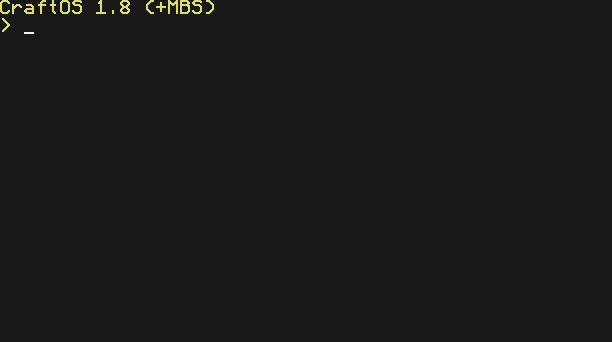Posted 21 March 2018 - 01:10 AM
Checkpoint helps your program get back to where it was by providing checkpoints to continue from, combine this with some intelligent "where were we" logic at the start of each checkpoint and saving of essential data to disk (functionality not provided by Checkpoint) and your program will be able to continue as if the world didn't stop existing :blink:/>.
Download it with pastebin get mNMJpZG2
Checkpoint is also on GitHub!
Using Checkpoint
Here is an example file (the one I used to test this program, it uses all of the functions provided by Checkpoint).
And here is the output of the above:

GIF made with RecGif
Order of Execution
It is advised to not have statements after a call to checkpoint.reach as they are not garanties to be compleated at least once. However this may be useful if the callback needs to do some cleanup which would not be needed to be done if the program closed and restarted at the checkpoint.
Given a program like this one:
Future Improvements
Download it with pastebin get mNMJpZG2
Checkpoint is also on GitHub!
Using Checkpoint
Here is an example file (the one I used to test this program, it uses all of the functions provided by Checkpoint).
local checkpoint = dofile(shell.dir().."/checkpoint.lua") --# Checkpoint can also be loaded with require and os.loadAPI
-- DEMO FLAGS
local doTerminateTest = true --# boolean
local doCheckpointRemoveTest = false --# boolean
local doErrorInCallbackTest = false --# boolean
local useCheckpointErrorTrace = false --# boolean
local checkpointFileName = nil --# nil or string, nil for default, string should be absolute path
-- END OF DEMO FLAGS
local args = {...}
--# Checkpoint works using callbacks, we define a bunch here with inventive names like t, c and d
local function t(...)
print(table.concat({...}, " ")) --# just test code
args = {"test"} --# notice that this doesn't effect anything, although
checkpoint.reach("second") --# this tells Checkpoint what to run next, checkpoint.reach returns whatever the callback returns
end
local function c(...)
print(table.concat({...}, " "))
print("Queuing terminate event, rerun program for next part of test")
if doTerminateTest then
os.queueEvent("terminate")
end
checkpoint.reach("third")
end
local function d()
print("Terminate?")
sleep(0.001) --# catch that terminate if we are on first run, second run won't have a terminate
print("I'll take that as no")
if doErrorInCallbackTest then
error("doErrorInCallbackTest")
end
if doCheckpointRemoveTest then
checkpoint.remove("third") --# removing checkpoints is more of a debug thing to make sure that your program is flowing in the right direction
print("removing third checkpoint, prepare for error")
checkpoint.reach("third")
end
return "return test"
end
--# here we define our checkpoints under the following format:
--# label - this is the name of the checkpoint and what your program will need to use to refer to it
--# callback - this is the function which gets called when checkpoint.reach is given the corresponding label
--# callback args - these are the values passed to the callback when it gets called
checkpoint.add("start", t, 1, unpack(args))
checkpoint.add("second", c, 2, unpack(args))
checkpoint.add("third", d)
local r = checkpoint.run("start", checkpointFileName, useCheckpointErrorTrace) --# identifies if your program needs to continue or starts from given label if it doesn't
print(tostring(r)) --# checkpoint.run returns whatever the last checkpoint callback does
And here is the output of the above:

GIF made with RecGif
Order of Execution
It is advised to not have statements after a call to checkpoint.reach as they are not garanties to be compleated at least once. However this may be useful if the callback needs to do some cleanup which would not be needed to be done if the program closed and restarted at the checkpoint.
Given a program like this one:
local checkpoint = require "checkpoint"
local function c1() --# first callback
print("1")
checkpoint.reach("second")
--# danger zone
print("2")
end
checkpoint.add("first", c1)
local function c2() --# second callback
print("3")
end
checkpoint.add("second", c2)
checkpoint.run("first")
1
2
3
1
3
Future Improvements
Better errors, particularly with tracebacks. If it's the program which is causing the error then I would like the error to message to blame it correctly. If anyone knows how to do this I would appreciate the help.Rewrite: see if I can avoid "function chaining", idea: checkpoint.reach sets anextCheckpointvalue and returns instead of calling the next callback, when checkpoint.run sees this it runs that next checkpoint after setting to nil, if the next one is nil then assume program end This may help improve errors or at lease make implementing improvements to the error reporting easier. I'll look into this when it's not 1:23 AM
Edited on 23 April 2018 - 07:40 PM


